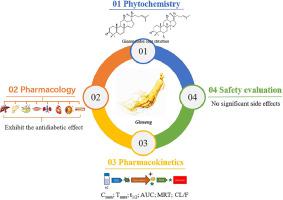Phytomedicine ( IF 6.7 ) Pub Date : 2021-09-10 , DOI: 10.1016/j.phymed.2021.153717 Yage Liu 1 , Hao Zhang 1 , Xuan Dai 1 , Ruyuan Zhu 1 , Beibei Chen 1 , Bingke Xia 1 , Zimengwei Ye 1 , Dandan Zhao 1 , Sihua Gao 1 , Alexander N Orekhov 2 , Dongwei Zhang 1 , Lili Wang 3 , Shuzhen Guo 4

|
Background
Radix Ginseng, one of the well-known medicinal herbs, has been used in the management of diabetes and its complications for more than 1000 years.
Purpose
The aim of this review is devoted to summarize the phytochemistry and pharmacokinetics of Ginseng, and provide evidence for the antidiabetic effects of Ginseng and its ingredients as well as the underlying mechanisms involved.
Methods
For the purpose of this review, the following databases were consulted: the PubMed Database (https://pubmed.ncbi.nlm.nih.gov), Chinese National Knowledge Infrastructure (http://www.cnki.net), National Science and Technology Library (http://www.nstl.gov.cn/), Wanfang Data (http://www.wanfangdata.com.cn/) and the Web of Science Database (http://apps.webofknowledge.com/).
Results
Ginseng exhibits glucose-lowering effects in different diabetic animal models. In addition, Ginseng may prevent the development of diabetic complications, including liver, pancreas, adipose tissue, skeletal muscle, nephropathy, cardiomyopathy, retinopathy, atherosclerosis and others. The main ingredients of Ginseng include ginsenosides and polysaccharides. The underlying mechanisms whereby this herb exerts antidiabetic activities may be attributed to the regulation of multiple signaling pathways, including IRS1/PI3K/AKT, LKB1/AMPK/FoxO1, AGEs/RAGE, MAPK/ERK, NF-κB, PPARδ/STAT3, cAMP/PKA/CERB and HIF-1α/VEGF, etc. The pharmacokinetic profiles of ginsenosides provide valuable information on therapeutic efficacy of Ginseng in diabetes. Although Ginseng is well-tolerated, dietary consumption of this herb should follow the doctors’ advice.
Conclusion
Ginseng may offer an alternative strategy in protection against diabetes and its complications through the regulations of the multi-targets via various signaling pathways. Efforts to understand the underlying mechanisms with strictly-controlled animal models, combined with well-designed clinical trials and pharmacokinetic evaluation, will be important subjects of the further investigations and weigh in translational value of this herb in diabetes management.











































 京公网安备 11010802027423号
京公网安备 11010802027423号